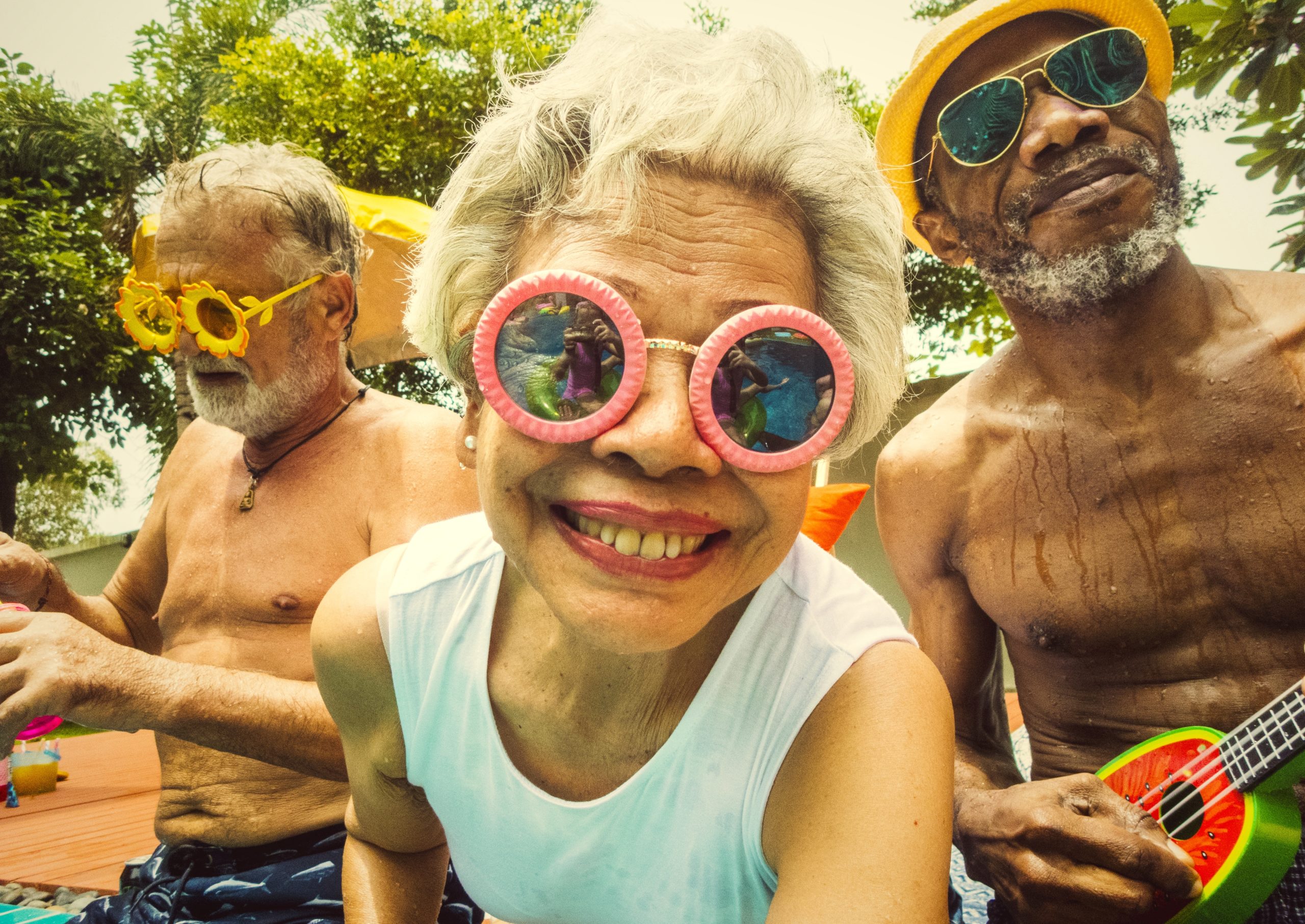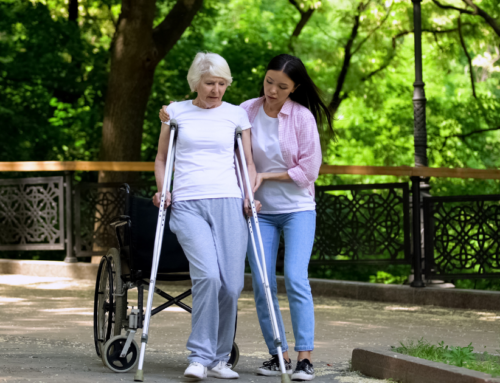First and foremost, we at New Wave Home Care want to wish you a fulfilling, happy, and active New Year. Toward that end, we have some practical tips, or resolutions, if you will, that you might attempt. Now before we get started, much like rules, resolutions seem destined to be broken. So why do we make them, and why do we save them for the beginning of a year when they can easily be made at any time? Is it habit, tradition, or like Beowulf, are we “boasting,” thereby making a pledge to king and community in order to be held to our word? The answer is mostly all of the above. In modern times, New Year’s resolutions are a society-wide sanctioned, judgmental-free opportunity for a second chance to do better. New Year’s resolutions are met with unilateral positive support, as opposed to the “crabs in a basket*” behavior we encounter at any other time of the year when we announce our intentions for positive change.
For some of us, particularly seniors facing the deterioration cycle of life, just getting through another year relatively unscathed, status as quo as possible, is quite frankly a triumph. However, we at New Wave Home Care believe that striving for improvement is what keeps us vital, and in some cases, can even turn back the clock—even if only for a few minutes (it’s worth it).

Here are some possible New Year’s resolutions for you to choose from. Select the ones that are most relevant to your needs, or those you feel you can succeed at. If you can do them all, so much the better. Before we get started, we’ve chosen to leave out the “greatest hits” of New Year’s resolutions, such as lose weight, quit smoking, give up or reduce alcohol consumption, watch less TV, and so on. We’re not saying that you shouldn’t attempt such things, but do so with the realization that giving up something creates a void that begs to be filled.
Rather than simply fight against relapse into old habits with willpower alone, which, let’s be honest, often weakens with age, these resolutions are more like guidelines for living that can fill such voids—focusing your attention away from loss to gain. This in turn, can help you succeed in dealing with the top ten “go cold turkey” assortment of resolutions.
* Crabs in a basket— Crabs can be safely kept in a basket or bucket without a lid. The reason is that when one tries to escape, the other crabs will pull it down before it gets too far and another will attempt the climb, only to be met by the same behavior. Human beings will do the same thing when you attempt to make positive changes in your life, by supportively explaining every reason why your plans will fail. Some will find passive-aggressive means to stop you. Members of a group, whether out of envy, resentment, spite, or competitive feelings, will try to halt the progress of any member who attempts to achieve success beyond the others. A study conducted in New Zealand in 2015 showed an 18% average improvement in exam scores for students whose grades were reported in a way that prevented others from knowing their position in published rankings.
ENGAGE WITH LIFE
If you’ve raised a family, you grew accustomed to being in charge and always had a sense of purpose, even if at times, raising kids didn’t appear to make any sense whatsoever. The important thing is that caring for others takes you out of your head, where otherwise, playing around unsupervised can get you into trouble, particularly if you head over to the land of depression with nothing to pull you out.
There are things you can do to remain vital and engaged, whether it’s volunteering, continuing your education, acting as a mentor, or having a hobby that hopefully involves other people. Having purpose helps you avoid the negative health consequences of being sedentary and disengaged from life. This ties into the next resolution, which is:
DEVELOP A SOLID SOCIAL CIRCLE
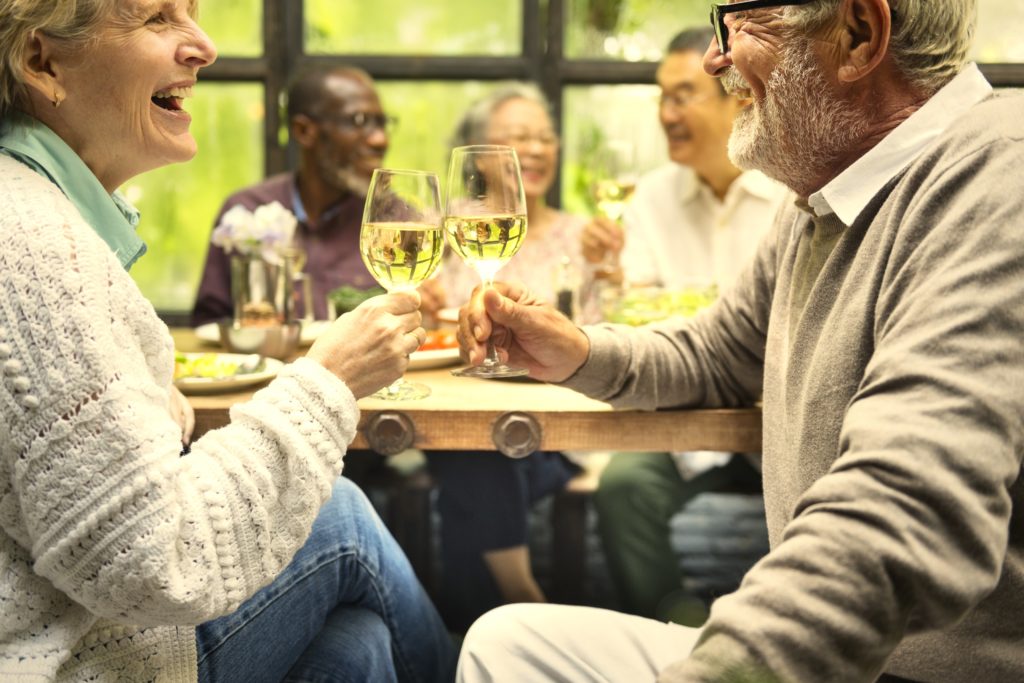
Creating a circle of friends, which can also double as a support system, not only provides company and help if we need it, but also keeps the mind stimulated. Friends also keep you more active and engaged with your community. That means you will be less likely to spend your retirement years at home in front of the television. And right there is another resolution. Yes, we did mention that a little binge-watching during the holidays raises dopamine levels in the brain and can act as a bulwark against loneliness, but it’s not a panacea. Too much can lead to depression and isolation. Think of TV as an electronic opium den. Also, most programming is not particularly uplifting and tends to be aimed at youth. Studies have shown that television can lower IQ levels and disengages the brain, making it lazy—exactly the opposite of what we’re going for.
Making friends may be easier said than done. Not everyone excels at socializing. This could be due to introversion or simply fewer opportunities to intermingle as we get older. Once the workforce finds us too “experienced” (a condition we refer to as, “over-qualifired”), we choose to retire, or nature is finished with us as reproductive beings, we tend to be cut loose from the pack.
If you’re among those who find making friends and socializing out of reach, perhaps it’s a matter of not knowing where to start.
NWHC isn’t going to leave you hanging. Even if you find the process daunting, force yourself to explore social opportunities in your area, such as clubs or senior center events. At the Pasadena Senior Center you’ll find a comprehensive list of clubs and events in which you can participate.
At Meetup.com, you can also find a list of seniors groups in and around Pasadena. There’s also a page for Active Seniors Groups. You can also become a member of Pasadena Village, which provides friendship, volunteer opportunities, and practical services that allow members to remain engaged in their community.
SOCIALIZE AND GIVE BACK WITH VOLUNTEERING
You can combine socialization and altruism by becoming a volunteer. Here are some of the best places seniors can volunteer and experience the feeling of being a vital part of something while turning up the gain in your brain. By placing your focus on volunteering, you might just find that friendships come of their own accord.
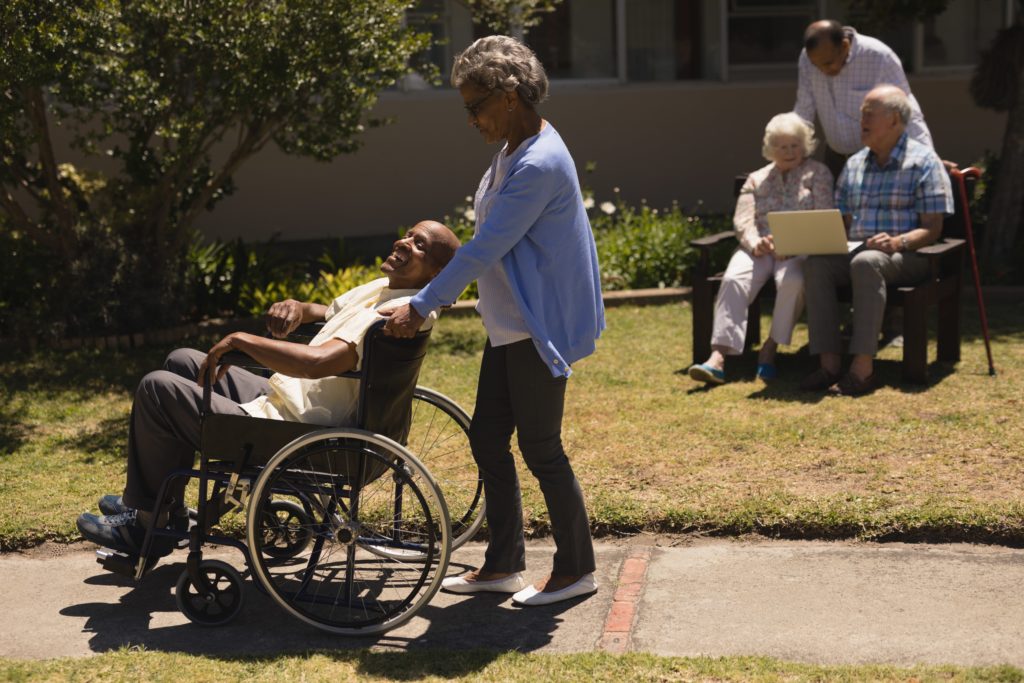
Senior Corps— If a way to not only help but also form social connections appeals to you, consider becoming a foster grandparent. Senior Corps has a Foster Grandparents program that gives retirees an opportunity to mentor children and youth.
Retired and Senior Volunteer Program— An additional volunteer program offered by Senior Corps is a program called RSVP. For those 55 and older, RSVP lets you share knowledge you’ve gained in life. Volunteer opportunities include organizing neighborhood watch programs, tutoring and mentoring youth, renovating homes, and assisting natural disaster victims.
Senior Companions—For seniors age 55 and over. Senior Companions provide aid and friendship and a way for older adults to remain at home instead of moving to a nursing home. Volunteers provide a break for caregivers by running errands and keeping clients company.
National Park Service—A great way to give back and get some fresh air is to volunteer for National Park Service. Benefits include meals and a stipend. Volunteers who work at least 250 hours are eligible to receive an annual pass (an $80 value) allowing free access to all federal recreation sites.
Musicians on Call—Musicians On Call sends volunteer musicians to hospitals. Volunteers perform in patients’ rooms as well as common spaces. You don’t have to be a musician to volunteer with Musicians on Call. You can also participate by becoming a volunteer guide escorting musicians to patients’ rooms.
AARP Foundation Experience Corps—Is for those age 50 and older who’d like to help children improve their reading skills. According to AARP’s website, students who work with Experience Corps volunteers see as much as a 60% improvement in critical literacy skills compared to those in their age group. Volunteers are expected to donate an average of six to 15 hours each week during the school year.
Habitat for Humanity—Help build and renovate housing for those in need of shelter. Many retired volunteers participate through its RV Care-A-Vanners program. This program allows anyone who travels by recreational vehicle to volunteer at different home-building. Experience not required.
Volunteers do more than help build and renovate homes. They also have the option of getting trained to be Master Safety Trainers, so they can help train people at other Habitat for Humanity sites on recent safety regulations. RV Care-A-Vanners can also join the desk staff and help with program management.
Big Brothers Big Sisters of America—gives volunteers an opportunity to mentor youth in need of an adult role model. Volunteers have a choice of working with community-based programs, children of military families, school-based programs, and children with incarcerated parents.
Volunteer While You Travel
Road Scholar— Road Scholar provides trips for those who want to volunteer while they travel. You can participate in activities such as assisting with a community water and sanitation project in Nicaragua, volunteering at the Navajo Nation Schools in Arizona, preserving national parks of the Potomac River, and teaching English in India.
Global Volunteers—Global Volunteers describes its program as a “community service project with a purpose.” There are several opportunities for volunteer abroad. All ages and backgrounds are welcome. Projects include providing healthcare, childcare, computer literacy, and nutrition education.
Peace Corps—The Peace Corps actively seeks volunteers who are age 50 or older. Depending on the type of volunteer work you choose, your service can last anywhere from three months to two years; your choice of country and type of work. However, certain health conditions might make you ineligible.
RESOLVE TO KEEP YOUR MIND ACTIVE AND ENGAGED
The more you use your brain, the better it works. There are plenty of things you can do to engage your mind, such as reading or doing puzzles of all sorts. Even playing solitaire or Sudoku helps brain activity. Look into continuing your education. Some colleges in the L.A. area offer free tuition for seniors. Check out the Seniorly website:
Learning a musical instrument offers benefits on multiple fronts. Both mathematical and creative by nature, it engages both sides of the brain. Learning an instrument also has a physical component, which improves coordination. Plus, music provides a spiritual boost. If you’re worried about disturbing neighbors (apartment walls are thin), there are myriad instruments built for private practice (yes, even drums if you wish to channel your inner Keith Moon).
Just listening to music has benefits for seniors. According to the Elder Care Alliance, “Research has found that music can promote relaxation, improve productivity and lower stress. For seniors, pleasing melodies can deliver even more benefits for physical and mental health, memory, and important social connections.”
RESOLVE TO EAT HEALTHIER FOODS
Nutritional needs change as we age. Seniors tend to require fewer calories but more key vitamins and nutrients. For example, vitamin D and B12 deficiencies are more common in older adults than their younger counterparts.
Adjusting your diet to meet these changes is important. One resource for learning more is ChooseMyPlate.gov from the US Department of Agriculture. Here you will find information and suggestions for making smart food choices and creating healthy meals.
Consider Dietary Supplements and/or a Multivitamin
Consult your healthcare provider regarding any supplements or vitamins that you would benefit from. There are over-the-counter options that may be helpful in your quest to stay as healthy and strong as possible.
BE PHYSICALLY ACTIVE
Even if you have a condition that impacts your health, such as heart disease, diabetes, or arthritis, physical activity can still be made safe for seniors. For those with diagnosed conditions, exercise is encouraged and can often help with some of the symptoms related to these conditions. Obviously, you should consult a physician before you engage in any form of exercise. There are local resources available for you to explore exercise opportunities. Check with your physician, senior centers, or join a Silver Sneakers program in your area. There are six in Pasadena.
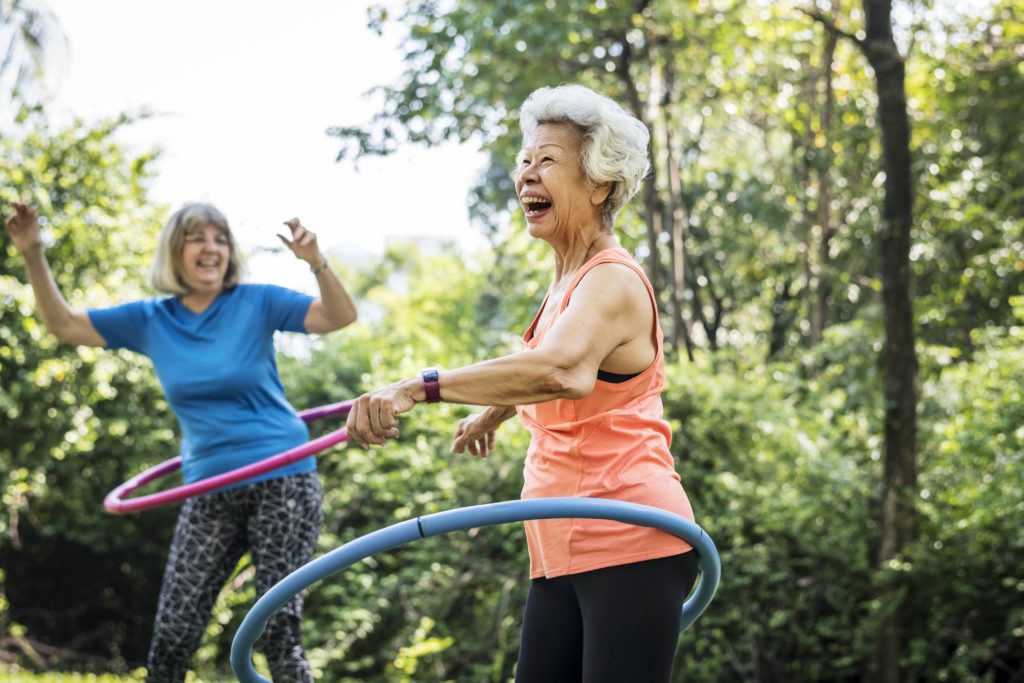
You might also find Go4Life created by the National Institute on Aging, to be useful. Their site has a variety of free fitness resources and videos designed exclusively for older adults.
ONE FINAL NOTE
Where you choose to spend your retirement can have a positive or negative impact on your health. Carefully consider geographic location, type of housing, and weather—all of which can enhance or diminish quality of life. If you’re in Pasadena, you’ve already got two out of three. And of course, there’s always New Wave Home Care to help pick up the slack and offer personalized suggestions and assistance. In the meantime, there is much for you to look into for the coming year.
Above All, New Wave Home Care wishes you a healthy and happy 2020!
DISCLAIMER: This information is not intended to diagnose health problems or to take the place of medical advice or care you receive from your physician or other healthcare providers. Always consult your healthcare provider about your medications, symptoms, and health problems.
